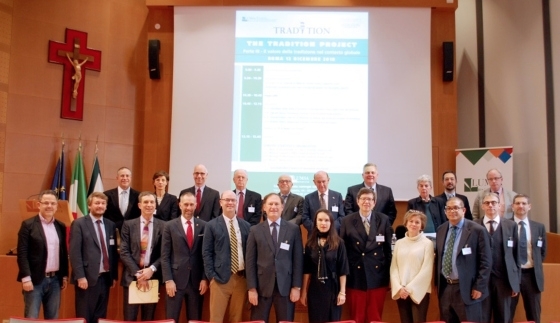
In December, jurists and scholars from the United States and Europe gathered at the central Rome campus of Università LUMSA for “The Value of Tradition in the Global Context,” the third session of the Tradition Project hosted by the Law School’s Center for Law and Religion. The Rome session was co-sponsored by LUMSA and Villanova University’s Eleanor M. McCullen Center for Law, Religion, and Public Policy. The event featured a keynote address by Associate Justice Samuel Alito of the U.S. Supreme Court.
Launched in 2016 as a three-year research initiative, the Tradition Project seeks to develop a broad understanding of what tradition might continue to offer for law, culture, and politics, and explores the relationship between tradition and change in today’s world. For its first session, the Project presented a conference on “Tradition in Law and Politics.” Last year’s session brought together scholars, judges, lawyers, bloggers, and policy experts for a sustained, two-day roundtable on “Tradition, Culture, and Citizenship.”
As a highlight of this year’s Tradition Project session, Justice Alito spoke about the relationship between international and national law in the context of human rights. “The conflict between global human rights norms and local legal traditions has become acute over the past decade,” says Professor Mark L. Movsesian, who directs the Center for Law and Religion and co-directs the Project with Professor Marc O. DeGirolami. “Justice Alito’s keynote addressed a timely topic in a substantive way. We were so honored to have him with us.”
After Justice Alito’s remarks, the Project convened a panel of respondents that included Giuseppe Dalla Torre, president of the Vatican City Tribunal; Ugo De Siervo, president emeritus of the Italian Constitutional Court; Chantal Delsol of the Academie des Sciences Morales et Politiques; and Andrés Ollero of the Spanish Constitutional Tribunal.
The session also included four invitation-only workshops on “Understandings of Tradition in the Global Context”; “Local Traditions and Global Government”; “Liberalism, Populism, and Nationalism”; and “Tradition and Human Rights.” Participants prepared short reflection papers on the various topics. “There was a lot to discuss in the workshops, and there will be a lot to keep elaborating and deepening in the near future,” says LUMSA Professor Monica Lugato, one of the Tradition Project session organizers. “It was a challenging and rewarding academic meeting.”
Reflecting on the Rome session, Villanova Professor Michael Moreland, another of the session organizers, says: “The Tradition Project has made an exceptionally important contribution to the academic conversation about law, culture, and politics over its three sessions. The most recent session in Rome, with its keynote address from Justice Alito, was particularly rewarding, and it was a privilege for Villanova University's McCullen Center to co-sponsor it.”
As he looks back on the Tradition Project’s three-year run and considers its next iteration, Professor Movsesian shares: “We’ve done what we set out to do, namely, to revive interest in a topic, tradition, to which relatively few legal scholars pay attention nowadays. We’ve sparked a conversation that seemed impossible even a short time ago. It’s a vital conversation that will certainly be ongoing.”
Related News
St. John’s Law Students Volunteer to Close the Justice Gap for New Yorkers
On Friday afternoons, Room 116 in the Queens County Civil Courthouse becomes a bridge between classroom learning, community service, and justice in action for a dedicated group of St. John’s Law...
Law Matters: A Conversation With Professor Robin Boyle-Laisure
In this installment of our Law Matters story series, Dean Jelani Jefferson Exum speaks with Professor Robin Boyle-Laisure about her scholarship and advocacy addressing cults and human trafficking...
St. John’s University School of Law Receives Historic Gift to Name DiMartino/Smith Public Interest Center
Dean Jelani Jefferson Exum has announced that the Public Interest Center at St. John’s Law will be named the DiMartino/Smith Public Interest Center in honor of alumna Rose DiMartino ’81 and her spouse...
